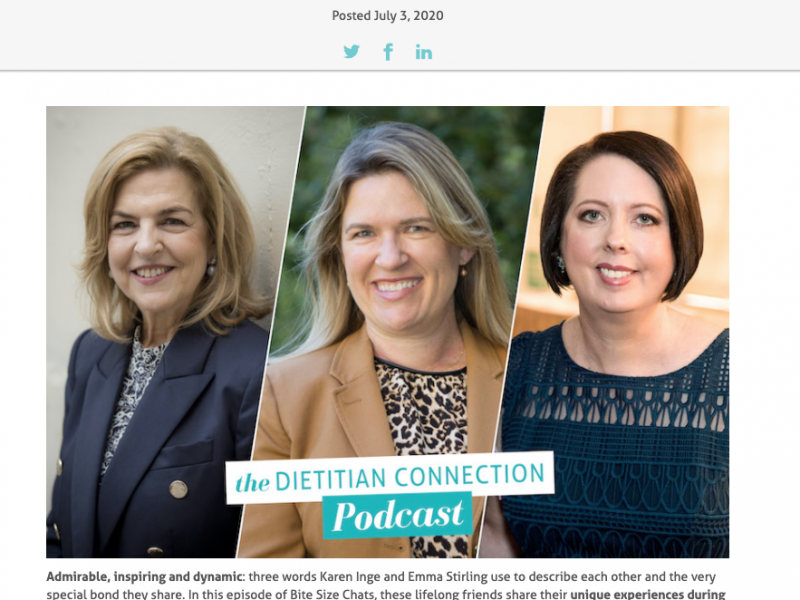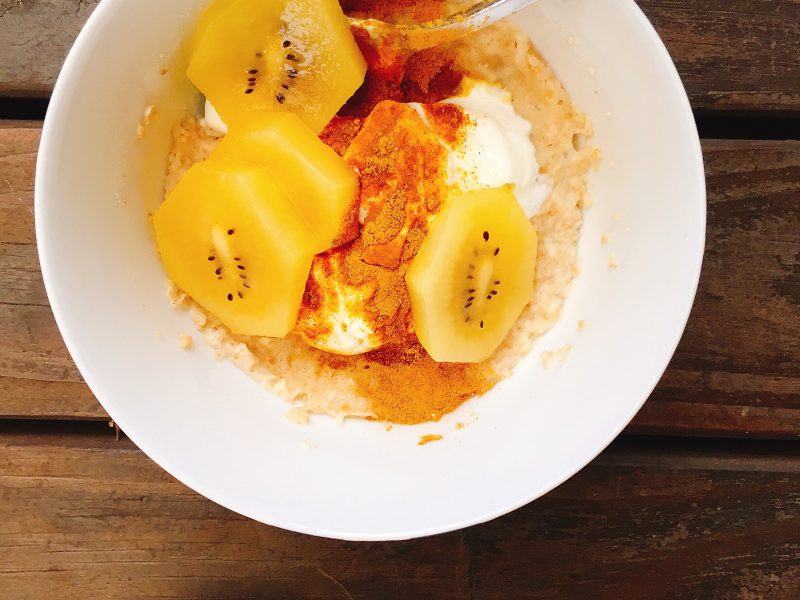Food labelling is HOT right now. With the recent hype surrounding front-of-pack labelling, the launch of a barcode-scanning traffic light app and the appearance of kilojoules on menu boards, nutrition figures are in vogue. Whilst the visibility of this information is a positive step towards empowering people to make healthier food choices, just how meaningful are the numbers to the average punter? A new pictorial food guide, Spoons for Thought goes some way to helping people crack the numbers game and make sense of the food they eat – enter the humble teaspoon. We asked dietitian Emily Houlahan to give us the low down on this new resource.
Emily Houlahan is an APD passionate about good food and healthy living. Emily has recently completed a 12-month nutrition cadetship with Dairy Australia and is the new Communications Coordinator of Chobani Australia. Beside being a lover of dairy foods and social media, Emily’s interests lie in nutrition communications and sports nutrition.
Abstract numbers are absent and words take a backseat to pictures in this non-prescriptive approach to weight-loss by APDs Justine Hawke and Sally Johnston. As its name suggests, Spoons for Thought promotes mindful eating by using teaspoon measures to give tangible meaning to grams of fat, saturated fat and sugar (where 1tsp = 5g) contained in everyday foods and meals.
I got in touch with our APD friends, Justine and Sally to congratulate them on their new book and asked them to share these insights with you:
Much of the fat and sugar we consume is hidden in our everyday foods and meals. We developed Spoons for Thought to provide a meaningful way to look at the food we choose to eat and help you to make informed choices by identifying where this fat and sugar is found. With this information at your fingertips, you can make simple dietary changes to become healthier and reduce your weight.
Many people would know that you, Sally, specialise in providing nutrition advice to bariatric (weight loss) surgery patients. So who is the target audience of Spoons for Thought?
Sally: I find myself regularly educating my clients that bariatric surgery is not magic. Good food choices and regular physical activity must accompany bariatric surgery to not only lose weight, but maintain weight loss long term. Spoons for Thought has been an excellent addition to my individual consultations, providing a new way to inspire change in my clients.
Spoons for Thought is for anyone who is sick of fad diets and looking for a simple, sustainable way to lose weight. It can also be useful for those who may not need to lose weight, but improve their food choices. For example, it can assist people with heart disease identify foods high in saturated fat and those with diabetes identify sources of excess sugar.
What do you hope to achieve through Spoons for Thought?
Spoons for Thought offers a transparent way for people to understand the food they eat. The key principles of a healthy diet include reducing excess fat, particularly saturated fat, excess sugar and salt. The high impact images throughout enable the reader to identify sources of these in their diet. In addition, the practical tips provide ideas for simple swaps that can be made to improve their intake. We are not advocating a ‘no spoons’ approach, but more inspiring positive change.
My Thoughts
I love the premise of Spoons for Thought – that small changes can make a big difference to kilojoule intake and weight. It’s something we dietitians tend to harp on about. The authors have gone one step further to creatively translate that message into a language of teaspoons, to give tangible meaning to the weight-loss story.
At first glance the different coloured teaspoon symbols might appear confusing but with some guidance from the key in the opening pages, all makes sense. From here on, Spoons for Thought serves up core food groups, drinks, ‘extra’ foods such as snacks and ‘miscellaneous’ foods such as sauces. And since almost half of all meals are now eaten outside the home, just as important are the pages dedicated to dining-out and take-away foods, including multicultural cuisines.
While the focus on negative nutrients is a limitation of the book, simplicity is its strength. Text is kept to a minimum and the authors have done well to explain complex nutrition concepts using simple language. Images of food are accompanied by their respective teaspoons of fat, saturated fat and sugar on uncluttered pages. The images are not life-size but depict the food or meal as normally prepared, with serving sizes noted in cups or grams. Foods high in salt (greater than 500mg/100g as per Heart Foundation guidelines) are highlighted by a salt-shaker symbol.
I’ll be honest; Spoons for Thought is not for everyone. If you’re looking to drop a couple of dress-sizes before your school reunion next Friday, this is not the book for you. You’ll find no meal plans, set target numbers or food deprivation exercises in Spoons for Thought. It does not tell you what to eat to lose weight.
What Spoons for Thought does do is teach you how to make healthier food choices – which I believe is a more valuable lesson. It offers healthy practical tips, guidance on “finding teaspoons in food labels” and examples of balanced meals. And the best feature of Spoons for Thought is the simple visual guide which makes obvious the better choice amongst comparable foods. In this way, Spoons for Thought encourages the removal of enough teaspoons of fat and sugar to make a difference to your weight, without forcing you to give up the flavours and meals you enjoy. Bon appétit!
Editor’s comment:
Thanks Emily and huge congrats on your new position. I love seeing dietitians publish credible resources and I think Spoons for Thought would be a great addition to anyone’s library. Copies of Spoons for Thought can be purchased individually or in bulk at www.spoonsforthought.com.au We also have one copy to giveaway to a lucky reader. So please drop us a comment below, telling us why you’d like to win the book. Entries open until 5pm Wednesday 2 May, 2012 AEST.







